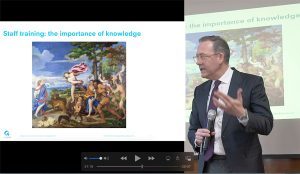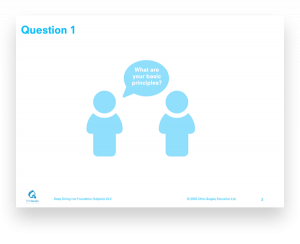Lots of useful parts to the day: Focus on long-term memory, Types of knowledge, Links to previous knowledge, Quadrants for each question, Clarity of curriculum, Broad and balanced discussion, What is powerful knowledge, Types of vocabulary, Types of reading material, Coverage is not progression, Clarity of threshold concepts and end points, Spaced retrieval, Debunked theories, Unsuitable activities, Dual coding, Types of assessment. Very thorough - I now need to digest this!
Learn about:
- Every aspect of curriculum design, through 14 questions and example answers
- The latest research evidence around effective curriculum design
- How to confidently answer questions about curriculum principles, sequencing and progression
- The curriculum from all aspects: senior leaders, curriculum leaders, class teachers and students.
- Questions to evaluate your curriculum
- Detailed explanation of answers
- Comprehensive summary of research findings
Why this course is relevant or important:
For many years, curriculum design in primary schools has focused on making content real, relevant, engaging and fun. Whilst there is nothing wrong with any of these things there has been a huge shift towards one of the biggest problems with learning: unless something is remembered in the long term it hasn’t been learned; it has been experienced, and just because the curriculum is real, relevant, engaging or fun doesn’t mean that it will be learned.
It is this thinking that underpins Ofsted’s deep dives into curriculum design.
This course will help you to articulate how your curriculum is designed for longterm memory.
A full day’s course…completely online
Through a series of 8 videos, Chris asks 14 questions and gives example answers, that enable you to carry out a full-scale review of your curriculum and give you unique ways to present your answers – all from the comfort of your home or school office.
Professional videos
Listen to Chris take you through the 14 questions in a series of professional videos recorded in February 2020 at our London conference.

Dual coded presentation
All of our presentations are created following the principles of dual coding theory so that you can focus on the content without endless bullet points.

Booking Options
The prices above are the total amount you will pay for your group plus VAT.
Just select Pay by Invoice and enter the required information.
You have 30 days to pay your invoice.
If your selected date to access the course is prior to 30 days we will still grant you access to the course and your invoice is payable in line with our Terms and Conditions.
If you have selected 1-5 delegates, for example, but you only enter the details of 2 of the delegates now, you will have the option to add additional delegates via your CQE account up until 48 hours prior to your requested course start date.
Pay by InvoiceVery informative and well presented. Online learning really helped my style of learning as I was able to pause and rewind to listen again. Can this also be an option for future courses. I was able to access this in a comfortable seating position without any awkwardness of dodging heads to view the screen.
The course has been very engaging throughout. What I particularly like is the fact it has been offered online as I was able to stop during the sessions, consider the impact to my own practise and also go back if I felt I had missed something. I also like how I can still go back through to different parts to check on references to the researchers discussed. Great course.
Found course very informative and has given me the interest to do some background reading on research mentioned.
An excellent course with so much useful content. Thank you for providing the deep dive research evidence and further reading list as this will be very beneficial. Also, the information on dual coding and cognitive load will be really useful to discuss with staff.
The training was very useful, particularly the research evidence and practical strategies, as well as the resources shared and ideas suggested. I would rate the overall quality of my booking as very good.
Everything Chris said ties in with what we’ve been talking about in school – cognitive load and the ability to commit information to memory, making it knowledge which can then be used. The session was great. It has given me lots to think about and share. Thank you!
Such a fantastic day full of a wealth of information. Clearly presented with time to digest the information and reflect. Truly valuable day. Huge thanks – I will recommend!
The training was really useful. In particular, the evaluation structure using the model as it will make us reflect on our practice using the guidance provided and give us steps for developing and improving.

.png)




